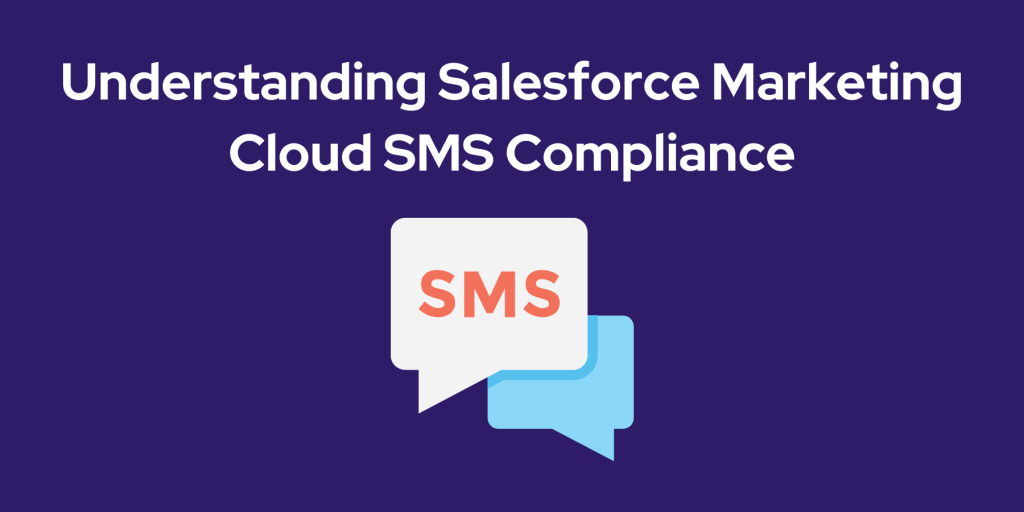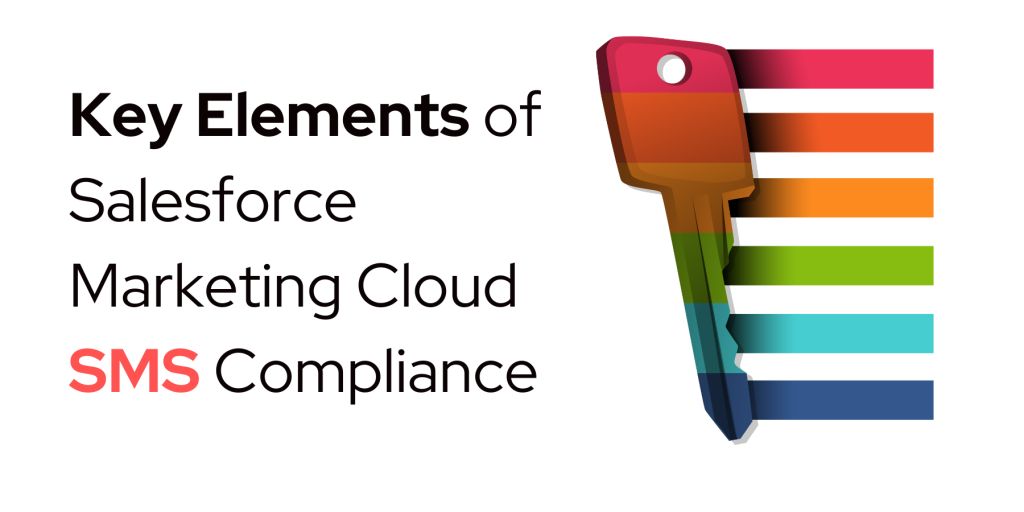Salesforce Marketing Cloud SMS Compliance
Salesforce Marketing Cloud SMS Compliance is crucial for businesses that use SMS marketing to reach their customers. Compliance ensures that SMS campaigns are not only effective but also adhere to legal and regulatory standards. In an age where data privacy and user consent are paramount, understanding and implementing SMS compliance rules is essential. This article explores key aspects of Salesforce Marketing Cloud SMS Compliance, including legal requirements, best practices, and how it integrates with other Salesforce tools like Salesforce Marketing Cloud Audience Builder. For further insights into optimizing your marketing strategies, refer to Lead Nurturing in Salesforce.
I. Understanding Salesforce Marketing Cloud SMS Compliance:

A. Regulatory Landscape:
Compliance in SMS marketing involves adhering to a complex web of regulations, including the Telephone Consumer Protection Act (TCPA) in the United States, the General Data Protection Regulation (GDPR) in Europe, and various local regulations worldwide. Salesforce Marketing Cloud SMS Compliance ensures that your SMS campaigns adhere to these regulations, protecting your brand from legal implications and building trust with your audience.
B. Opt-In and Opt-Out Mechanisms:
One fundamental aspect of Salesforce Marketing Cloud SMS Compliance is the implementation of clear opt-in and opt-out mechanisms. Subscribers must explicitly provide consent to receive SMS messages, and opting out should be straightforward. The platform facilitates the configuration of double opt-in processes to ensure explicit consent, safeguarding against unintentional messages.
II. Key Elements of Salesforce Marketing Cloud SMS Compliance:

A. Consent Management:
Salesforce Marketing Cloud provides tools for effective consent management. Marketers can configure consent forms and preferences centers to capture and store subscriber preferences, ensuring that only individuals who have expressly opted in receive SMS messages. The platform facilitates a robust consent infrastructure, allowing for easy documentation and retrieval of consent records.
B. Message Content and Frequency:
Compliance extends beyond consent to the content and frequency of SMS messages. Salesforce Marketing Cloud SMS Compliance guidelines emphasize the importance of sending relevant and non-intrusive content. Additionally, marketers can configure frequency caps to control the number of messages sent within a specific timeframe, preventing excessive messaging that could lead to subscriber dissatisfaction or non-compliance.
III. Configuring Salesforce Marketing Cloud for SMS Compliance:

A. Consent Workflows:
Salesforce Marketing Cloud provides configurable consent workflows that guide marketers through the process of obtaining and managing consent. These workflows can be tailored to align with specific compliance requirements in different regions. Marketers can leverage these tools to automate consent processes, reducing manual errors and streamlining compliance efforts.
B. Opt-Out Management:
Configuring effective opt-out mechanisms is a cornerstone of SMS Compliance. Salesforce Marketing Cloud allows marketers to set up automated opt-out processes, ensuring that subscribers can easily unsubscribe from SMS communications. This not only aligns with regulatory guidelines but also contributes to positive user experiences.
C. Compliance Reporting:
To facilitate adherence to regulations, Salesforce Marketing Cloud offers comprehensive reporting tools. Marketers can configure reports to track opt-in and opt-out rates, monitor message content, and assess overall compliance. These reports provide actionable insights for continuous improvement and demonstrate a commitment to regulatory compliance.
IV. Implementing Salesforce Marketing Cloud SMS Compliance liance:
To ensure compliance with SMS marketing regulations and best practices, follow these detailed steps to effectively implement Salesforce Marketing Cloud SMS compliance:
1. Configure Consent Management
Purpose: Track and manage consent to ensure that you have explicit permission from every recipient before sending SMS messages.
Steps:
i- Consent Records:
- Utilize Salesforce tools such as the Consent Management feature to document and store consent records.
- Ensure that consent records include details like the date, time, and method of consent, as well as the content of the consent given.
ii- Preference Centers:
- Set up a preference center where recipients can manage their communication preferences, including opting in or out of SMS communications.
- Integrate this preference center with Salesforce to automatically update recipient consent status.
iii- Double Opt-In:
- Implement a double opt-in process to verify the recipient’s consent. After an initial sign-up, send a confirmation SMS asking the recipient to reply or click a link to confirm their consent.
iv- Legal Compliance:
- Stay updated with relevant regulations such as GDPR, TCPA, and other local laws regarding SMS marketing.
- Implement necessary measures to ensure that consent management practices align with these regulations.
2. Set Up Opt-Out Processes
Purpose: Provide recipients with clear and easy ways to unsubscribe from SMS communications to respect their preferences and comply with regulations.
Steps
i- Automated Opt-Out:
- Implement automated opt-out mechanisms in Salesforce Marketing Cloud. Use keywords like “STOP” to trigger the opt-out process.
- Ensure that these keywords are universally recognized across all campaigns.
ii- Opt-Out Confirmation:
- Send an immediate confirmation message once a recipient opts out, confirming their request and reassuring them that they will no longer receive SMS communications.
iii- Unsubscribe Links:
- Include unsubscribe links in all SMS messages, directing recipients to a preference center where they can manage their communication preferences.
iv- Update Records:
- Automatically update recipient records in Salesforce when they opt out to prevent future SMS messages from being sent to them.
v- Testing and Validation:
- Regularly test the opt-out processes to ensure they are functioning correctly and providing a seamless experience for recipients.
3. Monitor and Audit
Purpose: Regularly review and ensure ongoing compliance of your SMS campaigns to maintain trust and adhere to legal requirements.
Steps
i- Regular Reviews:
- Schedule regular audits of your SMS campaigns to review compliance practices.
- Check consent records, opt-out processes, and message content for adherence to regulations.
ii- Salesforce Reporting Tools:
- Utilize Salesforce’s robust reporting tools to monitor campaign performance and compliance.
- Set up dashboards and reports to track key metrics such as opt-in rates, opt-out rates, delivery rates, and complaint rates.
iii- Compliance Training:
- Provide ongoing training for your marketing team on SMS compliance requirements and best practices.
- Ensure that all team members understand the importance of compliance and how to use Salesforce tools to achieve it.
iv- Feedback Mechanisms:
- Implement mechanisms to collect feedback from recipients about their SMS experience.
- Use this feedback to identify areas for improvement and to address any compliance concerns.
v- Adjustments and Improvements:
- Based on audit findings and feedback, make necessary adjustments to your SMS campaigns and compliance processes.
- Continuously refine your strategies to enhance compliance and recipient satisfaction.
By following these detailed steps, you can ensure that your SMS marketing efforts within Salesforce Marketing Cloud are compliant, effective, and respectful of recipient preferences. This approach not only helps in maintaining regulatory compliance but also builds trust and long-term relationships with your audience.
V. Best Practices for SMS Compliance
- Clear Messaging: Ensure that your SMS messages are transparent and contain clear information about the sender and the purpose of the message.
- Frequent Updates: Stay updated with changes in SMS regulations and adjust your practices accordingly.
- Education and Training: Educate your marketing team about SMS compliance requirements and best practices. Regular training can help prevent compliance issues.
Conclusion:
Salesforce Marketing Cloud SMS Compliance is a vital aspect of running effective and ethical SMS marketing campaigns. Understanding and implementing compliance guidelines ensures that your marketing practices are legal, ethical, and respectful of consumer rights. By following best practices and leveraging Salesforce tools, businesses can enhance their SMS marketing efforts while maintaining compliance.
